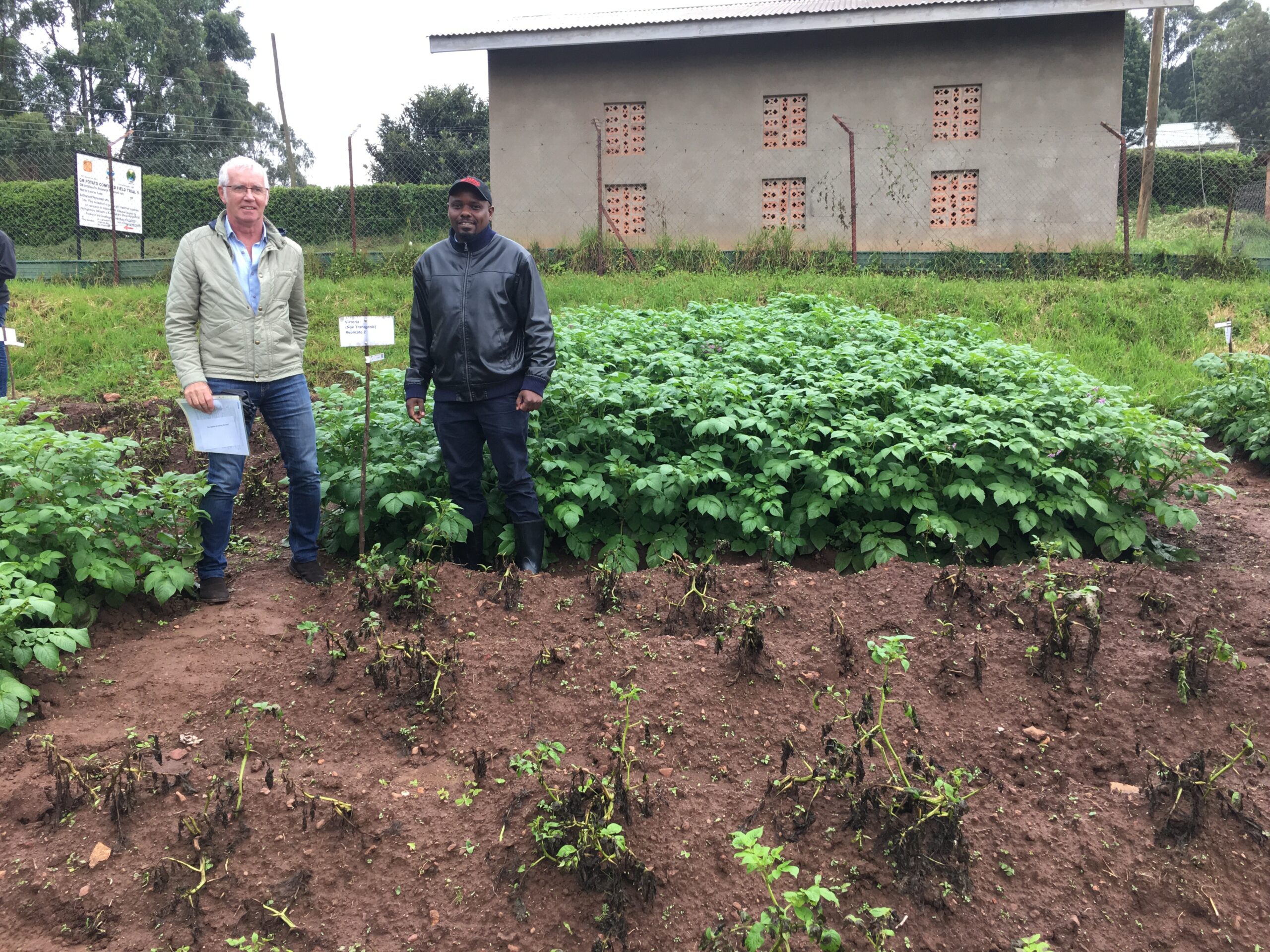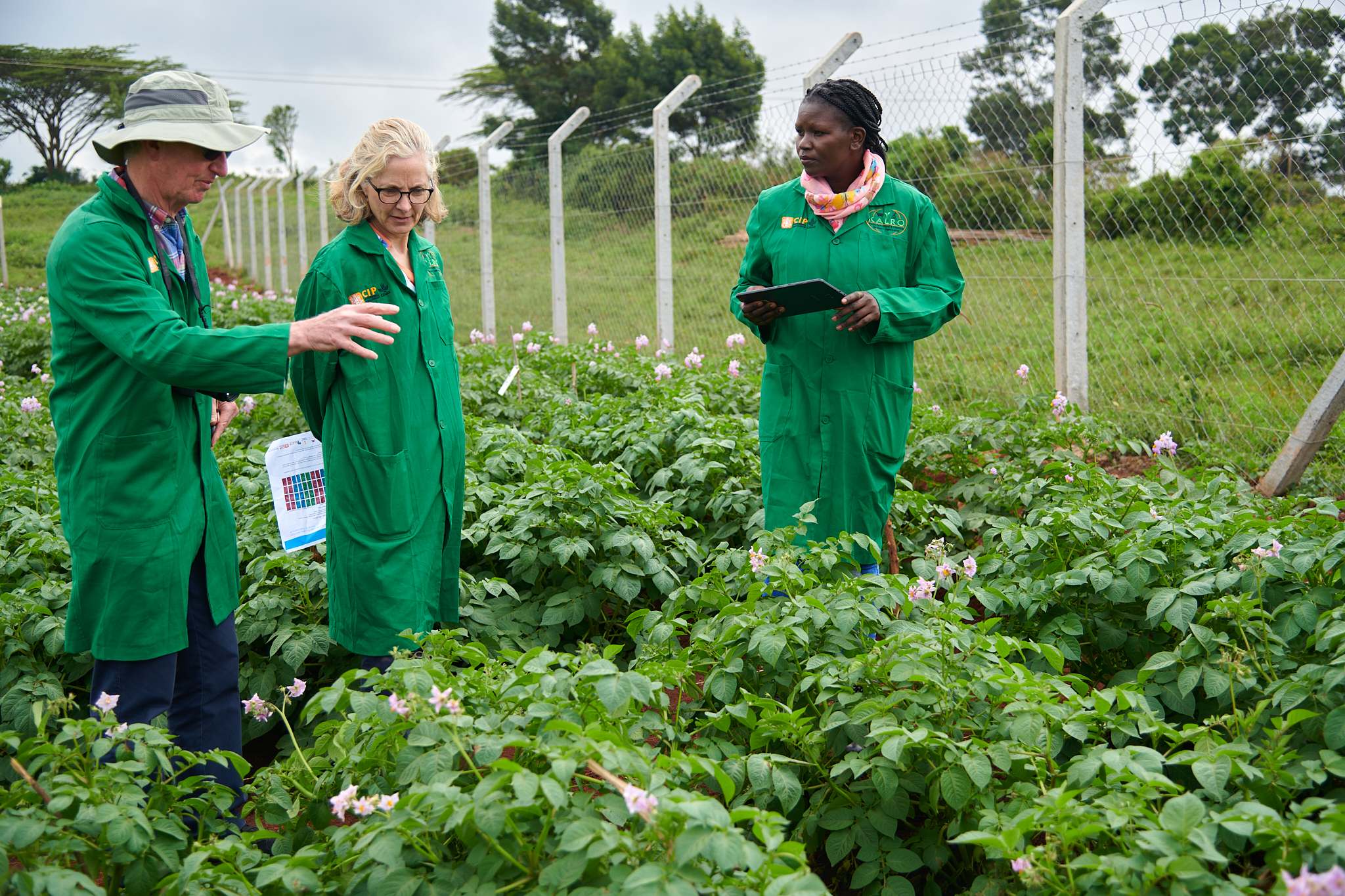"A zero-fungicide potato would mean a lot more money to smallholders in Africa who can barely afford to send their children to school, purchase a nutritionally-balanced diet, and access medical care."
—Dr. Marc Ghislain, Program Leader, International Potato Center - CIP
The challenge
Late blight disease caused by Phytophthora infestans is one of the most destructive crop diseases globally, affecting more than 3 million hectares of cultivated potato and causing economic losses estimated at $10 billion per year in the developing world alone. The potato produces nutritious food more quickly, on less land, and in harsher climates than any other major crop. It is therefore of major importance for smallholder and subsistence farmers in developing countries which produce over half of the world’s potatoes. However, control measure such as fungicides or resistant varieties may be unavailable or too expensive for smallholder and subsistence farmers. In Kenya and Uganda where over 1 million smallholder farmers grow potatoes, losses due to late blight can be up to 70% costing over $129 million per year in Uganda alone. Durable resistance can prevent these losses and help boost farmers’ food and economic security.
The strategy

Wild relatives of potato harbor genes that confer a high level of resistance to late blight. However, conventional breeding methods to introduce these genes into cultivated varieties have been on-going for more than 40 years, and varieties with single resistance genes can be overcome by P. infestans. Dr. Marc Ghislain, Dr. Eric Magembe, and colleagues at the International Potato Center (CIP) have worked for several years with the support of CGIAR and USAID to introduce a “stack” of three resistance genes from wild potato relatives into farmer-preferred East African varieties. Following greenhouse tests that showed that these plants were highly resistant to late blight, CIP partnered with colleagues at the National Agricultural Research Organization (NARO) in Uganda and the Kenyan Agriculture and Livestock Research Organization in Kenya to grow these potatoes under field conditions. Multiple seasons of trials have now shown that the resistance holds up well in the field in the absence of any fungicide applications. 2Blades has added its support to the effort to help continue field trials and advance the work towards deployment of durable late blight resistance.
The science
Late blight of potato is caused by the oomycete pathogen Phytophthora infestans. It is adapted to short-distance air dispersal and can persist between crops as mycelium in infected tubers. Current management of late blight relies on a combination of cultivar selection (though no cultivar is resistant to all strains), good drainage, crop rotation, and frequent fungicide applications. However, it is not always practical or economical to deploy these methods – particularly for subsistence or smallholder farmers, and no method provides 100% protection. Creating durable resistance to late blight is a priority, and this strategy uses the natural genetic resources available in potato relatives.
Since 2002, researchers have isolated and cloned several resistance genes against P. infestans from potato relatives. At CIP, three of these (RB, Rpi-blb2, and Rpi-vnt1.1) from the wild potato species Solanum bulbocastanum and S. venturii were introduced into susceptible Desiree and Victoria potatoes, which are farmer-preferred varieties in Uganda and Kenya. RB, Rpi-blb2, and Rpi-vnt1.1 are members of the NLR class of dominant resistance genes and confer resistance by recognizing different Phytophthora effector proteins. The “triple stack” of resistance genes makes it much more difficult for the pathogen to simultaneously adapt to and overcome this multi-layered defense.

Jonathan Jones and Diana Horvath visit CIP/KALRO potato field trial in Kenya
Rpi-vnt1.1 was first identified and cloned by 2Blades’ Scientific Advisory Board member Dr. Jonathan Jones at The Sainsbury Laboratory in Norwich, UK. (See MPMI (2009) 22(5):589-600 for further details.)
2Blades has been supported by public contributions for this important project. You can help to bring a durable, blight-resistant potato to African farmers – and help fight the disease that triggered the Irish Potato Famine:
Click here to help End The Blight in Africa.
Program Impacts
Webi, E. N., Kariuki, D., Kinyua, J., Njoroge, A., Ghislain, M., & Magembe, E. (2019). Extreme resistance to late blight disease by transferring 3 R genes from wild relatives into African farmer-preferred potato varieties. African Journal of Biotechnology , 18(29), 845-856. DOI: 10.5897/AJB2019.16856
 2Blades
2Blades